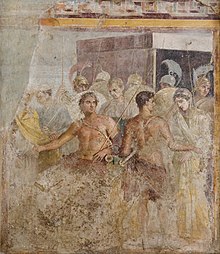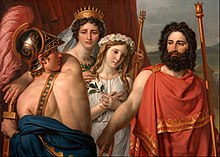Agamemnon
He was the son (or grandson) of King Atreus and Queen Aerope, the brother of Menelaus, the husband of Clytemnestra, and the father of Iphigenia, Iphianassa, Electra, Laodike, Orestes and Chrysothemis.
[3] This is based on the interpretation of the name as a compound word comprising the elements ἄγαν 'very much' and μένω 'to stay, wait; stand fast'.
[4] According to another view, the name developed from the unattested form *Ἀγαμέδμων (*Agamédmōn), a compound word composed of the elements ἄγαν 'very much' and μέδομαι[5] 'to think on, provide for', with the overall meaning of 'very mindful'.
[4] Linguist Václav Blažek proposes a relationship with Vedic Sanskrit Agni on etymological and functional bases.
He was eloquent, wise, and noble, a man richly endowed" (Agamemnonem albo corpore, magnum, membris valentibus, facundum, prudentem, nobilem).
Menelaus succeeded Tyndareus in Sparta, while Agamemnon, with his brother's assistance, drove out Aegisthus and Thyestes to recover his father's kingdom.
Thus misfortune hounded successive generations of the House of Atreus, until atoned by Orestes in a court of justice held jointly by humans and gods.
[15] Preparing to depart from Aulis, a port in Boeotia, Agamemnon's army incurs the wrath of the goddess Artemis, although the myths give various reasons for this.
Classical dramatizations differ on how willing either father or daughter are to this fate; some include such trickery as claiming she was to be married to Achilles, but Agamemnon does eventually sacrifice Iphigenia.
Other sources, such as Iphigenia at Aulis, say that Agamemnon is prepared to kill his daughter but that Artemis accepts a deer in her place and whisks her away to Tauris in the Crimean Peninsula.
In Book One, following one of the Achaean army's raids, Chryseis, daughter of Chryses, one of Apollo's priests, is taken as a war prize by Agamemnon.
After bitterly berating Calchas for his painful prophecies, which first forced him to sacrifice his daughter and now to return his concubine, Agamemnon reluctantly agrees.
After several days of fighting, including duels between Menelaus and Paris, and between Ajax and Hector, the Achaeans are pushed back to the fortifications around their ships.
Achilles refuses, only being spurred back into action when his companion Patroclus is killed in battle by Hector, eldest son of King Priam and Queen Hecuba.
His chief fault was his overwhelming haughtiness; an over-exalted opinion of his position that led him to insult Chryses and Achilles, thereby bringing great disaster upon the Greeks.
Ajax considers killing them, but is driven to madness by Athena and instead slaughters the herdsmen and cattle that had not yet been divided as spoils of war.
[19] After the capture of Troy, Cassandra, the doomed prophetess and daughter of Priam, fell to Agamemnon's lot in the distribution of the prizes of war.
According to the accounts given by Pindar and the tragedians, Agamemnon is slain in a bath by his wife alone, after being ensnared by a blanket or a net thrown over him to prevent resistance.
The curse begins with Agamemnon's great-grandfather Tantalus, who is in Zeus's favor until he tries to feed his son Pelops to the gods in order to test their omniscience, as well as stealing some ambrosia and nectar.
[27] Later, using his relationship with Poseidon, Pelops convinces the god to grant him a chariot so he may beat Oenomaus, king of Pisa, in a race, and win the hand of his daughter Hippodamia.
After growing to adulthood and being pressured by Electra, Orestes vows to avenge his father Agamemnon by killing his mother Clytemnestra and Aegisthus.
Finally, with the help of Athena and Apollo he is absolved of his crimes, dispersing the miasma, and the curse on house Atreus comes to an end.
[27] Athenaeus tells a tale of how Agamemnon mourns the loss of his friend or lover Argynnus, when he drowns in the Cephisus river.
[30] This episode is also found in Clement of Alexandria,[31] in Stephen of Byzantium (Kopai and Argunnos), and in Propertius, III with minor variations.
[32] The fortunes of Agamemnon have formed the subject of numerous tragedies, ancient and modern, the most famous being the Oresteia of Aeschylus.









